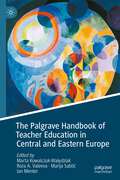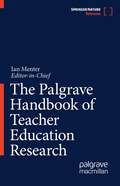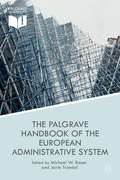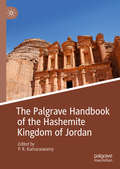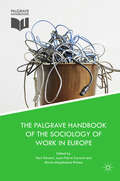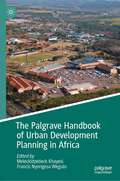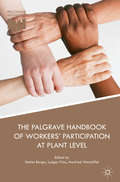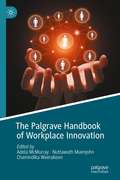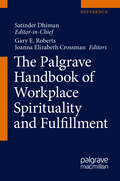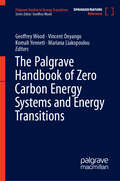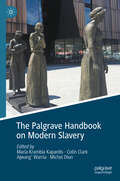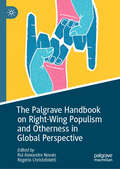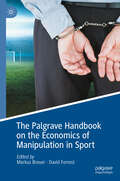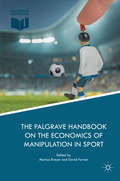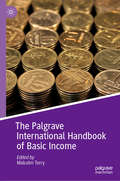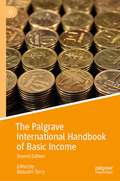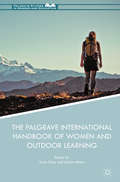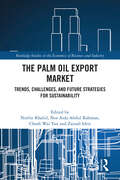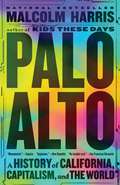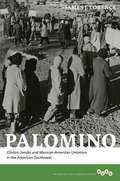- Table View
- List View
The Palgrave Handbook of Teacher Education in Central and Eastern Europe
by Marta Kowalczuk-Walędziak Roza A. Valeeva Marija Sablić Ian MenterThis handbook provides a comprehensive, scholarly overview of teacher education in Central and Eastern Europe (CEE), since the fall of communism in 1989. It looks closely at recent trends, emerging practices, and possible futures for teacher education in twenty-one CEE countries – reaching from the Balkans, through the Visegrad Group, to Eastern Europe and the Baltics. The contributing authors reflect on their own countries’ uphill battles and journeys towards modernising teacher education over the last three decades. Subsequently, contemporary teacher education policies, structures, and practices are explored in light of Bologna reforms, EU higher education policies, and globalisation processes. Each chapter also offers some predictions about likely future trajectories – with concrete suggestions on how to develop and improve teacher education systems in response to the growing pressures of neoliberal ideologies. The Palgrave Handbook of Teacher Education in Central and Eastern Europe provides a valuable reference that enriches the work of scholars, students, policymakers, and practitioners across CEE and beyond.
The Palgrave Handbook of Teacher Education Research
This handbook presents a timeless, comprehensive, and up-to-date resource covering major issues in the field of teacher education research. In a global landscape where migration, inequality, climate change, political upheavals and strife continue to be broadly manifest, governments and scholars alike are increasingly considering what role education systems can play in achieving stability and managed, sustainable economic development. With growing awareness that the quality of education is very closely related to the quality of teachers and teaching, teacher education has moved into a key position in international debate and discussion. This volume brings together transnational perspectives to provide insight and evidence of current policy and practice in the field, covering issues such as teacher supply, preservice education, continuing professional learning, leadership development, professionalism and identity, comparative and policy studies, as well as gender, equity, and social justice.
The Palgrave Handbook of Technological Finance
by Raghavendra Rau Robert Wardrop Luigi ZingalesThis handbook provides the first comprehensive overview of the fast-evolving alternative finance space and makes a timely and in-depth contribution to the literature in this area. Bringing together expert contributions in the field from both practitioners and academics, in one of the most dynamic parts of the financial sector, it provides a solid reference for this exciting discipline. Divided into six parts, Section 1 presents a high-level overview of the technologically-enabled finance space. It also offers a historical perspective on technological finance models and outlines different business models. Section 2 analyses digital currencies including guides to bitcoins, other cryptocurrencies, and blockchains. Section 3 addresses alternative payment systems such as digital money and asset tokenization. Section 4 deals with crowdfunding models from both a theoretical perspective and from a regulatory perspective. Section 5 discusses data-driven business models and includes a discussion of neural networks and deep learning. Finally, Section 6 discusses welfare implications of the technological finance revolution. This collection highlights the most current developments to date and the state-of-the-art in alternative finance, while also indicating areas of further potential. Acting as a roadmap for future research in this innovative and promising area of finance, this handbook is a solid reference work for academics and students whilst also appealing to industry practitioners, businesses and policy-makers.
The Palgrave Handbook of the European Administrative System
by Michael W. Bauer Jarle TrondalDrawing on research from the administrative sciences and using organizational, institutional and decision-making theories, this volume examines the emerging bureaucratic framework of the EU and highlights that analyzing the patterns and dynamics of the EU's administrative capacities is essential to understand how it shapes European public policy.
The Palgrave Handbook of the Hashemite Kingdom of Jordan
by P. R. KumaraswamyThis Handbook presents a broad yet nuanced portrait of the Hashemite Kingdom of Jordan, its socio-political rifts, economic challenges, foreign policy priorities and historical complexities. The Hashemite Kingdom of Jordan has traditionally been an oasis of peace and stability in the ever-turbulent Middle East. The political ambitions of regional powers, often expressed in the form of territorial aggrandisement, have followed the Hashemites like an inseparable shadow. The scarcity of natural resources, especially water, has been compounded by the periodic influx of refugees from its neighbours. As a result, many—Arab and non-Arab alike—have questioned the longevity and survival of Jordan. These uncertainties were compounded when the founding ruler, King Abdullah I, became involved in the nascent Palestinian problem at the end of World War II. The annexation of the eastern part of Mandate Palestine or the West Bank in the wake of the 1948 War transformed the Jordanian demography and sowed the seeds of an uneasy relationship with the Palestinian component of its population, citizens, residents and refugees. Though better natural resources and stronger leaders have not ensured political stability in many Arab and non-Arab countries, Jordan has been an exception. Indeed, since its formation as an Emirate by the British in 1921, the Kingdom has seen only four rulers, a testimony to the sagacity and political foresight of the Hashemites. The Hashemites have managed to sustain the semi-rentier model primarily through international aid and assistance, which in turn inhibits Jordan from pursuing rapid political and economic reforms. Though a liberal, multi-religious and multicultural society, Jordan has been hampered by social cleavages especially between the tribal population and the forces of modernization.
The Palgrave Handbook of the Sociology of Work in Europe
by Paul Stewart Jean-Pierre Durand Maria-Magdalena RicheaThis book explores the key conceptual features of the development of the Sociology of Work (SoW) in Europe since 1945, using eleven country case studies.An original contribution to our understanding of the trajectory of the SoW, the chapters map the current state of the theoretical background of the sub-discipline's development to broader socio-political and economic changes, traced across a heterogeneous set of national contexts.Different definitions of the SoW in each country often reflect variations in the focus of analysis, and these chapters link the subject definition and focus to other social science disciplines, the state, as well as social class interests and ideologies. The book contends that the ways in which the sub-discipline makes sense of changes in work is itself a response to the type of society in which the sub-discipline is practiced, whether in the post-war social democratic West, the Soviet East, or today's societies, dominated by variant forms of neo-liberalism. It will be of use to scholars and students interested in the transnational history of the discipline of sociology, with a specific focus on the nexus between the sociology of labour, ideology, economics and politics.
The Palgrave Handbook of Urban Development Planning in Africa
by Meleckidzedeck Khayesi Francis Nyongesa WeguloWhere can one get a synthesis of research findings on urban development planning in Africa? This book addresses this gap in knowledge by distilling existing research to provide insights into theories, research designs, empirical findings and approaches on urban development planning in Africa. Starting with the overall planning culture and strategies, the book chapters move on to specific themes such as governance, population, poverty, water, recreation, transport, agriculture, air quality and rural-urban linkages. This book reduces the prevailing risk of unnecessary duplication of research and the inadequate attention that is being given to extending research in new areas. This situation has partly been due to existing research remaining scattered in different organizations and publications and has not been subjected to critical synthesis to unearth any new developments that it contains. The book makes available research findings to be utilized in current and future urban development planning in Africa.
The Palgrave Handbook of Workers’ Participation at Plant Level
by Ludger Pries Stefan Berger Manfred WannöffelComprising the study, documentation, and comparison of plant-level workers’ participation around the world, this volume meets the challenge of offering a global perspective on workers’ participation, representation, and models of social partnership. Value chains, economic life, inter-cultural exchange and knowledge, as well as the mobility of persons and ideas increasingly cross the borders of nation-states. In the knowledge age, the active participation of workers in organizations is crucially important for sustainable and long-term growth and innovation. This handbook offers lessons from historical, global accounts of workers’ participation at plant level, even as it looks forward to predict forthcoming trends in participation.
The Palgrave Handbook of Workplace Innovation
by Nuttawuth Muenjohn Adela McMurray Chamindika WeerakoonInnovation is a source of building long-term sustainability. If implemented successfully it can lead to superior organizational performance. To be competitive, companies and their leaders continuously strive to engage in new market spaces by developing and engaging in an innovative culture so as to differentiate themselves from their rivals. With contributions from scholars and practitioners, this Handbook provides evidence-based case studies to identify workplace innovation practices in developed and developing countries. Chapters are based on an organizational innovation framework and focuses on two major areas: the determinants of innovation and the process and outcome elements. It covers in-depth, cutting edge specialised topics such as frugal innovation, innovation associated with leadership as well as numerous organisational contexts such as for-profit and not for profit sectors and small, medium and large organisations. Essential reading for any student or scholar of innovation studies, this handbook provides novel coverage of innovation practices linked to organizational variables such as culture, ethics, leadership and performance.
The Palgrave Handbook of Workplace Spirituality and Fulfillment
by Satinder Dhiman Gary E. Roberts Joanna Elizabeth CrossmanThis book presents an up-to-date and comprehensive survey of the field of Workplace Spirituality. It uses a structured yet open-ended schema to capture the best of research and practices on the subject. Presenting a clear and concise approach to spirituality in the workplace, it traces the genesis and growth of this burgeoning field and suggests trends and future directions in Workplace Spirituality. Drawing upon various theistic and non-theistic traditions of the world, it negotiates a clear dialectic of different dimensions and models of Workplace Spirituality, including the best of emerging new age spiritualties. Weaving various strands of management, spirituality, religion, and positive psychology in a systematic manner, this Handbook provides an in-depth and critical appraisal of a wide array of topics such as: spiritual, social, and emotional intelligence; mindfulness, meaning and purpose and fulfillment at work; various forms of positive leadership such as servant, values-based, authentic, spiritual leadership; servant-followership and corporate citizenship behavior; workplace spirituality and organizational performance.
The Palgrave Handbook of Zero Carbon Energy Systems and Energy Transitions (Palgrave Studies in Energy Transitions)
by Geoffrey Wood Vincent Onyango Komali Yenneti Mariana LiakopoulouThe Palgrave Handbook of Zero-Carbon Energy Systems and Energy Transitions provides a comprehensive and authoritative source of information, analysis and recommendations on the multi- and inter-disciplinary subject of zero carbon energy systems. The Handbook will advance thinking and research underlying the on-going energy transition by; covering a wide range of energy technologies and sources (e.g. fossil fuels, renewables, low carbon energy) including investigating the potential of new and alternative technologies and fuel sources and looking at the power, heating/cooling and transport sectors; Looking at varied legal jurisdictions and governance approaches including developing and developed countries and investigating potential new approaches to achieving a zero carbon energy system; Providing a broad range of theoretical and methodological approaches from a range of disciplines; Inclusion of a global range of case studies from Africa, Arctic, Asia, Australasia, Europe, the Middle East, the Americas (Central, North and South) and the Pacific, from the international, national, sub-national to city/community level.
The Palgrave Handbook on Modern Slavery
by Maria Krambia Kapardis Colin Clark Ajwang’ Warria Michel DionThis handbook takes a comprehensive approach to studying and understanding modern slavery, particularly forced labour and human trafficking. It considers the historical and cultural roots of modern slavery and suggests that analyzing the issue from humanities, social sciences, criminological, and business perspectives could lead to a better understanding of its emergence worldwide. The handbook also highlights the role of religions/spiritualities and multinational corporations in the expansion of modern slavery and argues that exploring their potential ethical responsibilities is essential. Furthermore, it combines theoretical frameworks of intersectionality and globalization to study the interconnectedness of various factors in shaping and understanding modern slavery. Finally, it contains an impressive range of geographic and conceptual approaches to the problems of combating modern slavery.
The Palgrave Handbook on Right-Wing Populism and Otherness in Global Perspective (Global Political Sociology)
by Rui Alexandre Novais Rogério ChristofolettiThe Palgrave Handbook on Right-Wing Populism and Otherness in Global Perspective argues that a key characteristic of the recent rise in right-wing populist politicians worldwide is the pervasive dynamic of exclusionary conflicts and moral divisions, designated as meta-othering. This is achieved through the use of two distinct forms of otherization: 'upward' othering, which targets the establishment elites and their associates, and 'downward' othering, which involves demeaning and scapegoating certain out-groups or external outsiders. The Handbook takes a multidisciplinary approach and focuses on recent real-world expressions of right-wing populist tactics to justify, strengthen, or instrumentalize alterity narratives and claims. It provides a comprehensive analysis of manifestations of right-wing populism othering from diverse cases and variations around the world with a particular emphasis on including examples from the Global South.
The Palgrave Handbook on the Economics of Manipulation in Sport
by Markus Breuer David ForrestThis updated and expanded new edition explores how sport is manipulated for economic and political gain. Manipulation in sport takes many forms and carefully selected chapters detail the broad variety of ways this can take place. The different types of manipulation in sport are outlined, including doping, match-fixing, and breaking Financial Fair Play, to provide a foundation to the topic. The role of legal interventions, in particular the Court of Arbitration for Sport, is discussed, alongside the governance of sports organisations and the corruption of sporting organisations, to highlight how sport can be exploited by tainted political regimes. New chapters looking at whistleblowing, sportwashing, e-sports, and horseracing broaden the scope of the book and explore recent debates. This book aims to examine manipulation in sport through the lens of economics, bringing light to the various ways benefits can be gained from rule and regulation breaches. It will be relevant to students and researchers interested in sports economics and sport governance.
The Palgrave Handbook on the Economics of Manipulation in Sport
by David Forrest Markus BreuerSport has enjoyed steadily increasing prominence and economic importance since the Millennium. But threats to its integrity appear to have grown in parallel, undermining the very sense of innocence and fun which is an important part of its appeal. Threats to the spirit of sport come from internal, external and even state actors, who seek either to manipulate events on the field or to exploit the institutions of sport for their own ends. As the reputation of sport becomes more tarnished as a result, its sustainability as a significant part of the entertainment industry is called into question and loss of reputation may even result in decline in recreational play. In this wide-ranging collection of essays, the international team of contributors explores the structural economic sources of the problems that beset sport and address the question of ‘what is to be done?’ through economic reasoning. Specific topics covered include doping, match-fixing for betting or sporting gain, the role of forensic statistics in detecting nefarious activity, issues related to club ownership, corruption in the awarding of mega-events and within sports governing bodies, and the role of the law and the Court of Arbitration for Sport. In the final chapter, the Editors pull together the various strands and propose that policy to mitigate the threat to fair play should be built around two themes: improving sports governance and designing incentives to help actors in sport choose honest over manipulative behaviour. The book will appeal to practitioners from sport management as well as to academics including students and researchers.
The Palgrave International Handbook of Basic Income (Exploring the Basic Income Guarantee)
by Malcolm Torry“This Handbook offers a timely ‘snapshot’ of the fast-moving global debates on Basic Income. Embracing a range of ideological, ethical, historical and cross-national perspectives, it looks at the case for Basic Income through both a focused and a wide-angled lens. Rather than asserting hard and fast conclusions, it ends with the valuable message that context is all.”—Ruth Lister, Loughborough University, UK “A must-read Handbook that provides solid foundations for the growing number of researchers, policymakers and campaigners involved in the ongoing debate on Basic Income."—Rubén M. Lo Vuolo, the Interdisciplinary Centre for the Study of Public Policy, Argentina “A comprehensive, competent, accessible, up-to-date picture of the current state of knowledge and debate on basic income in several disciplines and in many countries.”—Philippe Van Parijs, the University of Louvain, Belgium A Basic Income is an unconditional regular payment for every individual. But is it desirable? And is it feasible? This Handbook brings together scholars from various disciplines and from around the world to examine the history, characteristics, effects, viability and implementation of Basic Income. A variety of pilot projects and ideological perspectives are considered in depth.
The Palgrave International Handbook of Basic Income (Exploring the Basic Income Guarantee)
by Malcolm TorryThis handbook brings together scholars from various disciplines and from around the world to examine the history, characteristics, effects, viability and implementation of basic income. The first edition of this book contributed a comprehensive treatment of multiple aspects of the basic income debate. This updated, expanded edition tackles new topics that are becoming increasingly prominent in the global debate. New chapters are devoted to recent research on the history of basic income; the development and peacemaking potential of basic income in conflict zones; municipal experiments in the United States; requirements for pilot projects and experiments; and the public health implications of basic income. Existing chapters on the implementation of basic income have also been substantially updated to take account of new research on microsimulation, land value tax, local currencies, and blockchain technology and cryptocurrency, along with new material on the increasing use of opinion polls and the difficulties related to that. New political and ethical perspectives on the role of trade unions and their increasing engagement with the basic income debate are also introduced, while the section on pilot projects and experiments has been updated to cover recent political developments. Fully updated to reflect new global developments in the basic income debate, this handbook will be of interest to researchers, teachers and research-oriented policymakers in a range of fields.
The Palgrave International Handbook of Women and Outdoor Learning
by Tonia Gray Denise MittenThis Handbook serves as a starting point for critical analysis and discourse about the status of women in outdoor learning environments (OLEs). Women choose to participate actively in outdoors careers, many believing the profession is a level playing field and that it offers alternatives to traditional sporting activities. They enter outdoor learning primarily on the strength of their enthusiasm for leading and teaching in natural environments and assume the field is inclusive, rewarding excellence regardless of age, gender, socioeconomic status, disability, or ethnicity. However, both research and collective experiences in OLEs suggest that many women feel invisible, relegated, marginalized, and undervalued. In response to this marginalization, this Handbook celebrates the richness of knowledge and practices of women practitioners in OLEs. Women scholars and practitioners from numerous fields, such as experiential outdoor education, adventure education, adventure therapy, and gender studies, explore the implications of their research and practice using poignant examples within their own disciplines. These insights emerge from similar life experiences as women and outdoor leaders in the 1970s to the present. Social inequalities still abound in OLEs, and the Handbook ensures that the contributions of women are highlighted as well as the work that needs to be done to make these spaces inclusive.Global in perspective and capacious in content, this one-stop volume is an indispensable reference resource for a diverse range of academics, including students and researchers in the fields of education, psychology, sociology, gender studies, geography, and environment studies, as well as the many outdoors fields.
Palm Computing, Inc.--1995: Financing Challenges
by Stephanie Dodson Myra M. HartThe president, Donna Dubinsky, and the chairman and founder, Jeff Hawkins, discuss an opportunity to sell their company to U.S. Robotics. They must weigh this option versus accepting venture capital funding, partnering with a large company that could provide distribution channels and capital, or continuing a search for capital from other sources.
Palm Computing, Inc. (A)
by Myra M. HartDiscusses patents, licenses, and deal making in a start-up venture. The entrepreneur, Jeff Hawkins, holds a patent on Palm Print, a pattern recognition algorithm. After licensing Palm Print to his employer, he led three years of development of commercial products for the company. Focuses on Hawkins's efforts to start a new, noncompeting venture that requires cross-licenses for the Palm Print enhancements. The employer wants Hawkins to stay to develop the new products "in-house" and resists making an agreement.
The Palm Oil Export Market: Trends, Challenges, and Future Strategies for Sustainability (Routledge Studies in the Economics of Business and Industry)
by Norlin Khalid Rahman, Nor Aida Abdul Cheah Wai Yan Zainab IdrisThis book provides a comprehensive examination of the palm oil export market, including analysis of its current challenges and move towards sustainability.Adopting a multidisciplinary approach, this volume is written by contributors ranging from the fields of economics, engineering, and chemical sciences. Chapters address a wide range of topics including trade market, environmental sustainability, economic dynamics, and future directions to implement nanotechnology and biowaste recycling in the palm oil industry. They synthesize existing research on the palm oil market, and examine the industry’s transformation efforts via technology adoption, biofuel energy research, and its response to new rules and policies from the EU market.This book would appeal greatly to scholars and researchers on international trade, supply chain management, and economic development, especially those in oil palm production and import countries.
Palma Africana
by Michael Taussig“It is the contemporary elixir from which all manner of being emerges, the metamorphic sublime, an alchemist’s dream.” So begins Palma Africana, the latest attempt by anthropologist Michael Taussig to make sense of the contemporary moment. But to what elixir does he refer? Palm oil. Saturating everything from potato chips to nail polish, palm oil has made its way into half of the packaged goods in our supermarkets. By 2020, world production will be double what it was in 2000. In Colombia, palm oil plantations are covering over one-time cornucopias of animal, bird, and plant life. Over time, they threaten indigenous livelihoods and give rise to abusive labor conditions and major human rights violations. The list of entwined horrors—climatic, biological, social—is long. But Taussig takes no comfort in our usual labels: “habitat loss,” “human rights abuses,” “climate change.” The shock of these words has passed; nowadays it is all a blur. Hence, Taussig’s keen attention to words and writing throughout this work. He takes cues from precursors’ ruminations: Roland Barthes’s suggestion that trees form an alphabet in which the palm tree is the loveliest; William Burroughs’s retort to critics that for him words are alive like animals and don’t like to be kept in pages—cut them and the words are let free. Steeped in a lifetime of philosophical and ethnographic exploration, Palma Africana undercuts the banality of the destruction taking place all around us and offers a penetrating vision of the global condition. Richly illustrated and written with experimental verve, this book is Taussig’s Tristes Tropiques for the twenty-first century.
Palo Alto: A History of California, Capitalism, and the World
by Malcolm HarrisNamed One of the Year's Best Books by VULTURE • THE NEW REPUBLIC • DAZED • WIRED • BLOOMBERG • ESQUIRE • SALON • THE NEXT BIG IDEA CLUBThe history of Silicon Valley, from railroads to microchips, is an &“extraordinary&” story of disruption and destruction, told for the first time in this comprehensive, jaw-dropping narrative (Greg Grandin, Pulitzer Prize-winning author of The End of the Myth). Palo Alto&’s weather is temperate, its people are educated and enterprising, its corporations are spiritually and materially ambitious and demonstrably world-changing. Palo Alto is also a haunted toxic waste dump built on stolen Indian burial grounds, and an integral part of the capitalist world system. In PALO ALTO, the first comprehensive, global history of Silicon Valley, Malcolm Harris examines how and why Northern California evolved in the particular, consequential way it did, tracing the ideologies, technologies, and policies that have been engineered there over the course of 150 years of Anglo settler colonialism, from IQ tests to the "tragedy of the commons," racial genetics, and "broken windows" theory. The Internet and computers, too. It's a story about how a small American suburb became a powerful engine for economic growth and war, and how it came to lead the world into a surprisingly disastrous 21st century. PALO ALTO is an urgent and visionary history of the way we live now, one that ends with a clear-eyed, radical proposition for how we might begin to change course.
Palomino: Clinton Jencks and Mexican-American Unionism in the American Southwest
by James J. LorenceThe first comprehensive biography of progressive labor organizer, peace worker, and economist Clinton Jencks (1918-2005), this book explores the life of one of the most important political and social activists to appear in the Southwestern United States in the twentieth century. A key figure in the radical International Union of Mine, Mill, and Smelter Workers (IUMMSW) Local 890 in Grant County, New Mexico, Jencks was involved in organizing not only the mine workers but also their wives in the 1951 strike against the Empire Zinc Company. He was active in the production of the 1954 landmark labor film dramatizing the Empire Zinc strike, Salt of the Earth, which was heavily suppressed during the McCarthy era and led to Jencks's persecution by the federal government. Labor historian James J. Lorence examines the interaction between Jencks's personal experience and the broader forces that marked the world and society in which he worked and lived. Following the work of Jencks and his equally progressive wife, Virginia Derr Jencks, Lorence illuminates the roots and character of Southwestern unionism, the role of radicalism in the Mexican-American civil rights movement, the rise of working-class feminism within Local 890 and the Grant County Mexican American community, and the development of Mexican-American identity in the Southwest. Chronicling Jencks's five-year-long legal battle against charges of perjury, this biography also illustrates how civil liberties and American labor were constrained by the specter of anticommunism during the Cold War. Drawing from extensive research as well as interviews and correspondence, this volume highlights Clinton Jencks's dramatic influence on the history of labor culture in the Southwest through a lifetime devoted to progress and change for the social good.
Pal's Sudden Service-Scaling an Organizational Model to Drive Growth
by Francesca Gino Bradley R. Staats Gary P. PisanoPal's Sudden Service has developed a unique operating model and organizational culture in the quick service restaurant business. With a deep emphasis on process control and improvement, zero defects, extensive training, and a high level of employee engagement, Pal's has been able to achieve excellent operating and financial performance. The case examines the challenges it potentially faces as it contemplates growing the chain significantly from the 28 units it currently operates.
